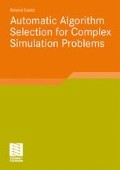Zusammenfassung
Chapter 2 already illustrated why only an empirical approach to algorithm selection is likely to succeed in the foreseeable future. Now that monitoring mechanisms are in place to feed observations into a dedicated performance database, as described in chapter 5, it has to be discussed how this data can be analyzed so that suitable selection mappings are generated (see fig. 6.1).
Access this chapter
Tax calculation will be finalised at checkout
Purchases are for personal use only
Preview
Unable to display preview. Download preview PDF.
Rights and permissions
Copyright information
© 2012 Vieweg+Teubner Verlag | Springer Fachmedien Wiesbaden GmbH
About this chapter
Cite this chapter
Ewald, R. (2012). Selection Mapping Generation. In: Automatic Algorithm Selection for Complex Simulation Problems. Vieweg+Teubner Verlag. https://doi.org/10.1007/978-3-8348-8151-9_6
Download citation
DOI: https://doi.org/10.1007/978-3-8348-8151-9_6
Publisher Name: Vieweg+Teubner Verlag
Print ISBN: 978-3-8348-1542-2
Online ISBN: 978-3-8348-8151-9
eBook Packages: Computer ScienceComputer Science (R0)

